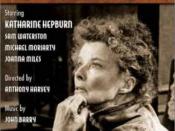No Father, No Play, No Glass Menagerie
Mr. Wingfield is the embodiment of escape in Tennessee Williams' The Glass Menagerie. Having abandoned his family years ago, Mr. Wingfield never appears onstage during the play and has not contacted his family, with the exception of a terse postcard from Mexico. Despite his absence, Mr. Wingfield is still an important part of the Wingfield family as his picture still hangs on the living room wall; a permanent reminder of better times. Tom, Laura and Amanda all believe that they can escape from the problems Mr. Wingfield's absence has created. In the end, though, no progress is made and the audience sees that none of the characters are able to make a clean break from their problems at hand.
Although Mr. Wingfield is never on stage and has no dialogue, he is the play's most influential character because he leaves his family in a state of emotional dysfunction.
Paradoxically, his main presence is his absence. Mr. Wingfield's abandonment of his family causes the characters of The Glass Menagerie to have difficulty in accepting the harsh reality of their situation, especially its financial insecurity. As a result, each member of the Wingfield family withdraws into a private world of illusion where he or she finds the solace that the real world does not seem to offer. Amanda remembers the glorious days of her youth, Laura plays with her glass menagerie and Victrola, and Tom has his dreams of adventure. Through the character of Mr. Wingfield, Williams uses the theme of escape throughout the play in order to demonstrate the hopelessness and futility of each character's dreams.
Amanda is arrested in the past because of the absence of her husband. She cannot accept that she is no longer the Southern Belle she once was.



Glass Menagerie
A very good essay with a logical explanation of your viewpoint, backed up by relevant quotes. You display a good understanding of the play and its characters.
My only suggestion would be to keep your conclusion to the points covered in the essay, but other than that I really enjoyed your essay.
Great job!
4 out of 4 people found this comment useful.